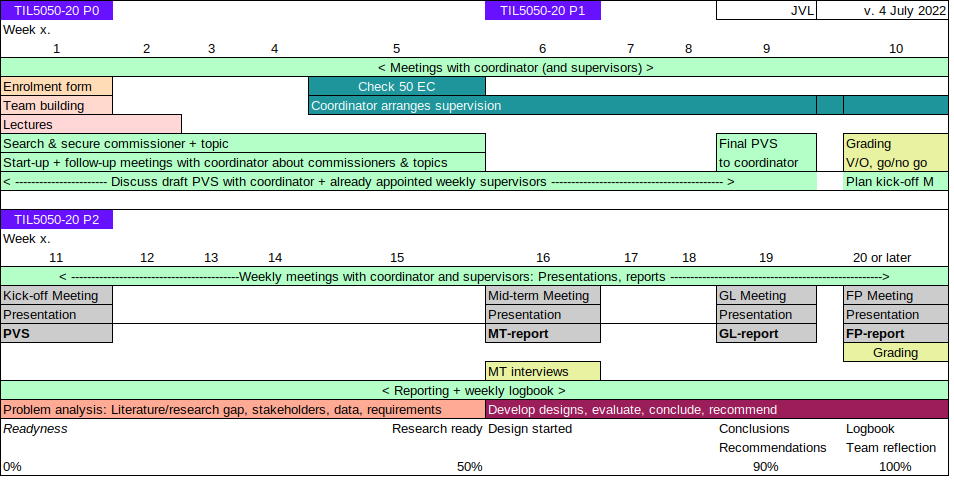TIL Design Project
About
Working on complex problems asks for interdisciplinary teams. A successful team uses the knowledge (theories, methodologies) and skills from all its members to develop solutions that cannot be found by most individuals. The results shall have real practical and sufficient academic relevance. One of the challenges is to match your own ideas with the requirements from your commissioner and the TU Delft.
Why design?
Design has been defined as (reference) "an open-ended and iil-structured process (..) with no unique solution and the candidate solutions cannot be generated with an algorithm." A design/systems engineering method should be used "to support decision making and trade-offs among competing possible solutions. Algorithms and mathematical formulations cannot replace the qualitative research tasks (such as stakeholder and requirements analysis), but they can be used later in the design process."
"The lack of structure and inadequacy of mathematical tools leads to the use of conceptual analysis in the first stage of the design process."
Experience a Living Lab
The Design project is a final test in interdisciplinary collaboration and a very useful preparation for your thesis project. Teams consist of 4-5 students with different bachelor and master specialisations, gender and in case of a multicultural team, also different (education) cultures and languages.
During a period of about 11 weeks you work on an assignment (P2), which you have prepared in course modules P0 and P1.
Assignments
Each team will have its own unique project experience. Commissioners are usually external parties; a company or a government agency. You have to attract these commissioners yourselves, which is another challenge. Each project offers an invaluable experience. You will be treated as a fellow worker. Many commissioners are willing to pay an internship fee as well.
About methodology
The core methodology is always systems engineering. This helps you to see a problem as part of a larger system, to scope your project, to find the root causes of the problem and to develop design requirements, constraints and kpi. These help you to finetune and evaluate your designs. You use several other methods and tools in the problem analysis phase and in the design phase.
The problem analysis deals with the what and why questions related with the problem. The design phase is meant to develop a few alternative ways of working in the organisation in order to mitigate / 'solve' its problems. If you develop a tool like a model, then this is just a tool to test the assumptions and possible effects of your designs (proof of concept), not the primary goal of the project. The same holds for a tool like scenario analysis.
Any method should be applied in a rigorous and transparent manner. The solutions should be applicable in practice and, once implemented, help to solve or mitigate the perceived problem(s) of your commissioner. What you deliver should work under given conditions.
The aim of the course is not to learn new theories or methods. You learn to apply what you learned in earlier courses in a real life setting. You will also experience how students from different specialisations apply their knowledge and skills and learn and benefit from that, just as they will learn and benefit from your work.
Coaching
A Design project is intended to ‘mimic’ a real-life project experience. The project is an externally monitored, but not managed project. This means that you are largely responsible for the results. Weekly coaching is offered by 1-2 supervisors with UTQ working in the TIL domain. The commissioner should also provide at least 1 supervisor.
Workload
This 10 EC course is very time consuming. It takes at least 2,5 days, sometimes 3,5 days per week. This is why it is scheduled in the second year of the TIL master (no exceptions). The team can decide where to work, but it is essential that each member works at least 1 day at the office of the company or agency.
Rules
Article 12* of the Annex of the Teaching and Examination Regulations (TER) applies.
The enrolment conditions are also in the enrolment form.
The course is not available as an elective and exclusively offered to MSc TIL students (no exceptions).
